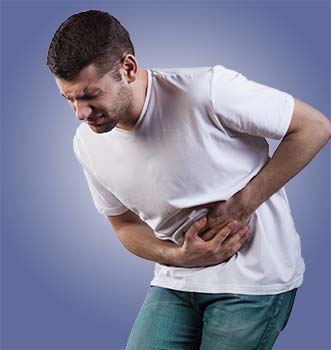Crohn's Disease. most commonly affects ileum (last part of small intestine) and colon (large intestine).
Symptoms of Crohn's Disease usually develops gradually but can also occur suddenly. They can range from mild to severe.
Signs and Symptoms of Crohn's Disease :
-
Abdominal pain:Colicky and cramping pain due to inflammation and ulceration of ileum and colon. Pain precedes and is relieved by defecation. Pain can be from mild to severe intensity with nausea and vomiting. This is chief feature in Symptoms of Crohn's Disease.

- Diarrhea:Diarrhea is a common symptom in Crohn's disease. Increased cramps in bowel can lead to loose stools. Severe inflammation of bowel is associated with a loss of digestive and absorptive surface, resulting in steatorrhea (excess fat in feces). These are leading Symptoms of Crohn's Disease.
- Fever and tiredness: Low grade fever is common mostly due to inflammation or infection. It is also accompanied feeling of fatigue and tiredness along with Symptoms of Crohn's Disease.
- Blood in stools: Bright red blood or dark blood mixed with stools is common occurrence in Crohn's disease.
- Mouth ulcers: You may have ulcers in your mouth similar to canker sores.
- Decreased appetite: Abdominal pain and cramping and the inflammatory reaction in the wall of your bowel can affect both your appetite and your ability to digest and absorb food.
- Weight loss: Weight loss is common. Up to 10 to 20% of body weight is lost. It develops due to diarrhea, anorexia, and fear of eating.
- Perianal disease: Perianal disease affects 1/3 rd of patients with Crohn's disease. It is manifested by incontinence, large hemorrhoidal tags, anal strictures, anorectal fistulae, and abscesses.
- Skin: Erythema nodosum, Pyoderma gangrenosum, Psoriasis, Perianal skin tags, aphthous stomatitis and "cobblestone" lesions of the buccal mucosa.
- Rheumatologic: Peripheral arthritis, Ankylosing spondylitis, Sacroiliitis, hypertrophic osteoarthropathy. Osteoporosis and osteomalacia due to malabsorption of calcium and vitamin D as well as glucocorticoid therapy.
- Eyes: One-third of patients develop Conjunctivitis, anterior uveitis, iritis, and episcleritis are common.
- Hepatobiliary: Fatty liver, Gall stones formation.
- Urinary system: The most frequent genitourinary manifestations are kidney stones, Ureteral obstruction, and fistulas. These are important Symptoms of Crohn's Disease.















